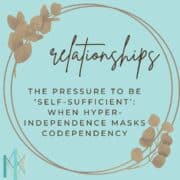
Many People in San Francisco Struggle with Codependency in Disguise
San Francisco is a city known for its innovation, ambition, and self-sufficiency. The tech industry, entrepreneurial culture, and high cost of living encourage people to be hyper-independent—to solve their own problems, push through challenges alone, and avoid relying on others.
But what if this fierce independence is actually a sign of codependency in disguise?
While most people think of codependency as excessive attachment or people-pleasing, the opposite can also be true. Many people in San Francisco have developed a pattern of extreme self-reliance as a way to avoid vulnerability, emotional dependence, or the discomfort of asking for help.
Learn more about codependency therapy in San Francisco
Hyper-Independence: The “Acceptable” Form of Codependency
Many people equate self-sufficiency with strength, especially in cities like San Francisco, where independence is seen as a virtue. But when self-sufficiency becomes extreme, it can actually be a trauma response—one that mirrors the patterns of classic codependency.
Traditional Codependency Traits
- Over-involvement in others’ problems
- Difficulty setting boundaries
- Fear of abandonment
- People-pleasing and approval-seeking
- Neglecting self-care to care for others
Hyper-Independent Codependency Traits
- Avoiding emotional intimacy altogether
- Rigid boundaries that prevent connection
- Fear of relying on others
- Excessive need to “do it all alone”
- Neglecting self-care due to overwork and burnout
While traditional codependency involves being overly enmeshed in relationships, hyper-independence is often an attempt to avoid relationships altogether or to keep them emotionally shallow.
Why San Francisco’s Culture Encourages Hyper-Independence
In a city where innovation and self-reliance are celebrated, it’s easy to mistake hyper-independence for emotional strength. Many people in San Francisco take pride in their ability to handle everything on their own—whether it’s advancing their careers, managing financial pressures, or maintaining an image of success. But beneath the surface, this extreme self-sufficiency can lead to isolation, burnout, and an inability to trust others in relationships.
For many, this pattern is reinforced by the fact that they moved to the Bay Area alone, leaving behind family support systems in pursuit of career opportunities. Without the built-in safety net of close relatives, self-reliance becomes a necessity—but over time, it can turn into an ingrained belief that needing others is a weakness. The longer someone functions this way, the harder it becomes to recognize when self-sufficiency is no longer serving them.
Hyper-independence often develops as a survival mechanism, shaped by workplace culture, financial stress, and personal history. While it may look like confidence, it can actually be a way of avoiding vulnerability or emotional connection.
1. The Tech Industry’s “Self-Sufficiency” Mindset
The San Francisco Bay Area is filled with people who have been conditioned to “figure it out on their own.” Startups glorify bootstrapping—doing more with less, taking on multiple roles, and solving problems without asking for help. This mentality spills over into personal relationships, making it hard to recognize when self-reliance has gone too far.
How it shows up:
- Feeling ashamed to ask for emotional or professional support
- Struggling to delegate tasks at work or in relationships
- Avoiding vulnerability because it feels like a weakness
- Overcommitting to work or side projects to avoid relying on others
- Keeping romantic relationships casual or surface-level to maintain control
- Turning to productivity and self-improvement as a substitute for emotional connection
- Feeling uncomfortable or resentful when others offer help
- Experiencing guilt or anxiety when taking time off
2. Financial Pressures and the High Cost of Living
San Francisco is one of the most expensive cities in the world, which means financial survival often takes priority over emotional well-being. Many people avoid depending on others because they associate financial independence with emotional independence, even though the two are not the same.
How it shows up:
- Staying in high-stress jobs even when they harm mental health
- Avoiding dating or deeper relationships due to fear of financial instability
- Feeling weak or behind if they need help from family or friends
- Prioritizing career advancement over personal relationships, believing financial stability must come first
- Hesitating to move in with a partner out of fear of financial dependence
- Avoiding therapy or mental health support because it feels like an unnecessary expense
- Feeling pressure to maintain a certain lifestyle to fit in with high-earning peers
- Working excessive hours to prove self-sufficiency, even at the cost of burnout
- Refusing financial support from family, even in times of real need
- Feeling guilty for taking vacations or time off, seeing rest as a financial risk
- Measuring self-worth by financial success rather than emotional fulfillment
3. Family Conditioning
Many people in San Francisco are first-generation professionals, immigrants, or from families with high expectations. If someone grew up in an environment where asking for help was discouraged—or even punished—they may equate self-sufficiency with survival.
How it shows up:
- Believing “If I don’t take care of myself, no one will”
- Rejecting emotional support even when it’s offered
- Feeling unsafe or undeserving of being cared for by others
- Struggling to express personal needs or emotions, fearing they will be seen as burdensome
- Feeling obligated to financially or emotionally support family members, even at personal cost
- Equating success with independence, avoiding collaboration or asking for mentorship
- Experiencing guilt when prioritizing self-care over work or family responsibilities
- Avoiding difficult conversations about boundaries due to fear of disappointing others
- Internalizing the belief that resilience means handling everything alone
- Downplaying personal struggles because others have “had it harder”
The Link Between Trauma and Hyper-Independence
For many people, hyper-independence is not just a personality trait—it is a trauma response. When someone has experienced emotional neglect, betrayal, or inconsistent caregiving, they may learn that relying on others is unsafe. In these cases, extreme self-sufficiency becomes a protective mechanism, a way to ensure they never feel abandoned, rejected, or let down again.
Some common trauma-related reasons for hyper-independence include:
- Growing up in an unpredictable or unstable environment where emotional or physical support was unreliable
- Experiencing betrayal or abandonment in close relationships, leading to a belief that trusting others is dangerous
- Surviving past emotional or physical abuse, where self-reliance was necessary for protection
- Being raised in a household where vulnerability was punished or dismissed, teaching a person to suppress their needs
- Believing that showing emotions makes you a target for harm – Learning early on that vulnerability led to criticism, rejection, or punishment, leading to a habit of suppressing feelings.
- Feeling the need to always be in control – Developing hyper-independence as a way to avoid unpredictability or chaos, especially after experiencing situations where others let you down.
- Struggling to ask for help, even in crisis situations – Associating dependence with weakness, making it difficult to seek support even when overwhelmed or in distress.
- Pushing people away when they get too close – Creating emotional distance to avoid the risk of being hurt, abandoned, or disappointed in relationships.
While these coping strategies may have been necessary for survival in the past, they can create barriers to intimacy and emotional well-being in adulthood. Therapy can help individuals identify these patterns, process past experiences, and gradually rebuild trust in relationships—allowing for healthy interdependence without fear.
How Therapy Helps Break the Cycle of Hyper-Independent Codependency
If you see yourself in these patterns, you’re not alone. Many people in San Francisco have internalized the belief that needing others is a weakness—when in reality, healthy interdependence is key to emotional well-being. Therapy can help identify the underlying causes of hyper-independence and provide tools for developing healthier, more fulfilling relationships without sacrificing personal autonomy.
Recognize When Self-Sufficiency Is Helping You Versus When It’s Isolating You
Independence can be empowering, but when it leads to chronic loneliness, emotional burnout, or an inability to trust others, it may no longer be serving you. Therapy can help you distinguish between healthy autonomy and self-protective isolation, ensuring that your independence supports your well-being rather than limiting it.
Signs that self-sufficiency has become isolating include:
- Struggling to reach out when you need support, even when you feel overwhelmed
- Avoiding emotional conversations or dismissing your own feelings as unimportant
- Feeling disconnected from friends or partners, even in close relationships
Understand How Past Experiences Shaped Your Fear of Depending on Others
Many people develop hyper-independence as a response to past experiences—whether it was family expectations, cultural influences, or personal traumas. Therapy can help you explore how early messages about self-reliance shaped your current behaviors and beliefs.
Common experiences that reinforce hyper-independence:
- Growing up in an environment where vulnerability was discouraged or punished
- Feeling responsible for others at a young age, leading to a belief that asking for help is a burden
- Experiencing rejection or betrayal when previously relying on someone for support
By uncovering these patterns, you can begin to rewrite your internal narrative around trust, support, and connection.
Develop Healthier Boundaries—Allowing for Mutual Support Without Enmeshment
Many people who struggle with hyper-independence also struggle with all-or-nothing thinking when it comes to boundaries. Either they keep people at arm’s length or feel overly responsible for others. Therapy helps you find a middle ground where you can:
- Accept support without feeling weak
- Set limits without fear of abandonment
- Build relationships that allow for mutual give-and-take, rather than one-sided caretaking or emotional detachment
Through therapy, you can practice assertive communication and boundary-setting strategies that support healthy interdependence rather than emotional avoidance or over-reliance.
Build Emotional Resilience Without the Need to Prove Your Worth Through Self-Reliance
Many high achievers and professionals in San Francisco tie their self-worth to productivity and independence. Therapy can help you separate your value from your ability to do everything alone and instead develop emotional resilience in a way that fosters deeper connection with yourself and others.
This may involve:
- Identifying and challenging perfectionist tendencies
- Learning to trust others without fear of disappointment
- Practicing self-compassion when facing vulnerability
Emotional resilience is not about enduring everything alone—it’s about knowing when to lean on others and when to stand firm on your own.
Challenge the Fear That Asking for Help Makes You Weak
Many people in San Francisco have been conditioned to view asking for help as a failure rather than a natural part of human connection. Therapy can help reframe this belief and demonstrate that seeking support is a sign of strength, self-awareness, and growth.
Break the Cycle of Overworking and Burnout
A hyper-independent mindset often leads to overworking as a coping mechanism. Therapy can help you recognize when productivity is being used as a way to numb emotional needs and teach you how to balance achievement with self-care and meaningful relationships.
Develop Emotional Awareness and Communication Skills
If you’ve spent years dismissing emotions as unnecessary distractions, therapy can help you reconnect with your feelings and express them in ways that strengthen your relationships. Emotional intelligence is essential for building fulfilling personal and professional connections.
Learn to Accept Love and Support Without Guilt
Many hyper-independent people feel uncomfortable receiving care or affection because they’ve been conditioned to believe they should handle everything alone. Therapy helps you practice accepting kindness, love, and support without guilt or discomfort, allowing for deeper and more fulfilling connections.
Ready for Therapy to Help You with Over-Independent Codependency?
If you’re struggling with hyper-independence, emotional avoidance, or fear of relying on others, therapy can help. Our San Francisco-based therapists specialize in helping high-achievers, professionals, and individuals with codependency patterns redefine healthy relationships—starting with themselves.
Browse our Therapist Directory




